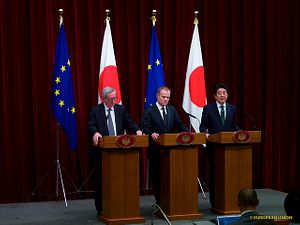The debate about the EU’s role in East Asia security is as old as its common Security and Defense Policy, and has always been controversial. With new strategic and security scenarios evolving the question remains what Europeans can and should do. As usual, the answers cannot be any better than the questions being asked.
Debates about the EU’s role in Asian security tend to depart from principled ideas about the primacy of trade relations vs. normative foreign policy, soft power politics vs. strategic military power or alignment vs. neutral brokership. The EU has in part contributed to this. The principles of the Common Security and Defense Policy (CSDP) did not resemble any collective defense system such as NATO. Rather, CSDP sought to complement NATO by building up a military force (or battle-group) that could respond to international crises on short notice.
The focus on humanitarian issues and state-failure added to the normative reputation of European security priorities. Additionally, the EU was criticized for its strong focus on trade and investment relations both with China and East Asia as a whole, while ignoring strategic security interests. More recent criticism targets the lack of military capabilities of the EU and individual member states with which to back up their political and economic influence in the Mediterranean and East. Given resistance by national legislators, any integrated common defense policy is a long way down the road.
However, many expectations are unfounded, for various reasons. First, beyond trade the implementation of EU’s external relations has been more opportunistic than strategic and thus more adapting to possibilities than grand designs. Second, in so doing the EU has been very pragmatic and issues oriented, according to its own abilities. Thus any criticism should target the EU’s capabilities to act or the type of issues that it is addressing.
As tedious as the repetitive patterns of EU speak and declarations about its East Asian security engagement over the past decade may be, it has clearly shown the limits of EU engagement. Most recently, High Representative of the Union for Foreign Affairs and Security Policy Federica Mogherini put forward the EU’s security goals at the annual Shangri-la Dialogue. There, she highlighted the strengthening of dialogue mechanisms, strategic partnerships, counter terrorism, disaster management, and maritime cooperation.
All in all, the EU emphasizes the cooperative nature of security engagement in Asia, with a focus on mutual security. The main foci are non-traditional security issues that are inviting for cooperation and that could be a stepping-stone for greater diplomatic engagement on hard security issues. Consequently, the EU sees itself as a diplomatic broker on hard security issues and not as a strategic military actor.
Beyond the EU’s own limitations, the situation in Asia is neither inviting for European strategic engagement nor is it urgent. The absence of a status quo in East Asia and the attempts by regional players to build up their militaries is creating new risks. With neither China nor the U.S. retaining sufficient influence in the region, evolving competition and counteraction have created new uncertainties.
Even if the EU should expand its extra-regional activities and decide to become a hard-security actor in East Asia, that move would send the wrong signals and have unintended long-term consequences. First, with China and the U.S. engaged in strategic dialogue and cooperation, there is for now little urgency to make groundbreaking strategic moves and establish leverage. Second, it is in the EU’s interests to positively influence the region’s security architecture by strengthening existing institutions and creating diplomatic mechanisms. Any attempt to back up this kind of involvement by stepping up military leverage would be counterproductive and add to the (bi-) polarization of Asia.
In sum, due to the capabilities, interests, and limitations of the Asian security environment the options for the EU are limited. Its real strength lies in closely analyzing the security issues in the region and targeting them either directly or indirectly. The European toolbox allows engagement on issues such as strengthening regional mechanisms, agreeing to codes of conduct for unresolvable territorial conflicts, supporting preventive diplomacy, cooperating on non-traditional security issues, or supporting Asian initiatives.
Additionally, the EU needs to address practical security issues more clearly. This involves the interests of small states and their status as well as issues in an evolving bipolarity. The European experience offers lessons and mechanisms to address these issues. Introspection about balancing the interests and consequences of arms trade in the region are crucial if double standards are to be avoided.
It is in the nature of strategic and military affairs that crisis response capabilities and strategic preparedness are on the agenda of all parties. In view of current trends the EU surely can’t sleepwalk. Consultation with the U.S. and China as major strategic actors in Asia and establishing common interests and security dialogue will be crucial in preparing for future challenges. As it comes to strategic preparedness the EU is, however, better advised not to engage in threat and alliance scenarios, but in anticipating probable situations and developing diplomatic responses. For the time being, military involvement is a matter for individual member-states, who most likely would act on their own initiative. Any common EU defense capabilities still need to be developed. The test case will not be in Asia.
Bernt Berger is Head of Asia Department and Senior Research fellow at the Institute for Security and Development Policy (ISDP), Sweden.

































